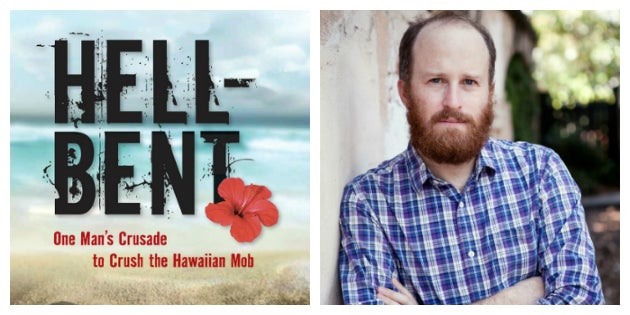Jason Ryan, a writer for College of Charleston Magazine, just published his second nonfiction crime book, Hell-Bent: One Man’s Crusade to Crush the Hawaiian Mob. Ryan had the enviable task of heading to Hawaii last year to research Honolulu prosecutor Charles Marsland’s efforts to destroy the local underworld. He came back to Charleston with a (slight) suntan and plenty of tropical vibes to spread across campus.
ARTICLE: Read The Charleston City Paper’s take on Ryan’s new book, Hell-Bent.
Before tackling the Hawaiian mob, Ryan wrote about South Carolina marijuana smugglers who made fortunes sailing tons of pot and hashish into the sleepy creeks of South Carolina and other parts of the East Coast. His book Jackpot: High Times, High Seas and the Sting that Launched the War on Drugs, also detailed the success of Operation Jackpot, a pioneering federal investigation that was the opening volley in Ronald Reagan’s War on Drugs.
Ryan, who works in the College’s Division of Marketing and Communications, answers a few questions about his latest book.
Q: Organized crime in Hawaii? You mean it’s not all beautiful beaches and sunshine?
A: I was astounded, too, when I learned about the existence of the Hawaiian underworld. The violence that occurred there so often in the 1970s seemed out of place in such serene and gorgeous surroundings. Yet the juxtaposition of paradise and brutality lent the story an exotic element that I found appealing. I decided if there was a dark side to Hawaii, it should be documented and people should know about it.
Q: Your story centers around prosecutor Charles Marsland. Why?
A: Charles Marsland became Honolulu’s head prosecutor following the unsolved, gangland murder of his 19-year-old son. It was an especially painful loss for the single father, and he grieved for years afterward, visiting his son’s grave almost daily. After ten years, his office finally charged three men with the murder. At the same time, the outspoken Marsland led a much broader assault against island crime. He was furious that the peaceful Hawaii he had enjoyed as a child had given way to a very violent landscape.
Q: Research in Hawaii sounds fun. Was it?
A: Certainly. Though I spent a lot of time in libraries and lawyers’ offices for my research and interviews, I was also able to enjoy the beauty of Oahu. I took a number of hikes, visited beaches and craters, swam in the powerful surf, and got to make my diet quite tropical, with plenty of mango, banana and pineapple. I also really enjoyed touring around the island in my rental car, exploring a truly fantastic place on earth.





